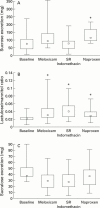Acute gastrointestinal permeability responses to different non-steroidal anti-inflammatory drugs
- PMID: 11600467
- PMCID: PMC1728510
- DOI: 10.1136/gut.49.5.650
Acute gastrointestinal permeability responses to different non-steroidal anti-inflammatory drugs
Abstract
Background and aims: Non-steroidal anti-inflammatory drugs (NSAIDs) cause gastrointestinal damage both in the upper and lower gastrointestinal tract. New anti-inflammatory drugs have been developed in an attempt to improve their gastrointestinal side effect profile. Our objective was to compare the effect on gastrointestinal permeability of acute equieffective doses of four different NSAIDs; three were designed to reduce gastrointestinal mucosal injury.
Materials: Healthy volunteers underwent sugar tests in a randomised fashion, 15 days apart, at: (1) baseline; (2) after two days of 75 mg slow release (microspheres) indomethacin; (3) after two days of 7.5 mg oral meloxicam which preferentially inhibits cyclooxygenase 2; and (4) after two days of 750 mg naproxen. A subgroup of subjects was tested after two days of 200 mg celecoxib. In each test, subjects ingested a solution containing sucrose, lactulose, and mannitol and sucralose, to evaluate gastroduodenal, intestinal, and colonic permeability, respectively.
Results: Gastric permeability was significantly affected by naproxen (p<0.05) but not by slow release indomethacin, meloxicam, or celecoxib. Intestinal permeability was significantly increased by the first three NSAIDs (p<0.05) but not by celecoxib. Abnormal lactulose/mannitol ratios were observed in 42% of meloxicam treatments, in 62% during indomethacin, and in 75% of subjects treated with naproxen. Finally, colonic permeability, as measured by sucralose, was not significantly increased by any of the four drugs.
Conclusion: Our study provides evidence that the newly developed NSAIDs reduce gastric mucosal permeability significantly. However, most produced significant alteration of small intestinal permeability. In contrast, our results suggest that celecoxib seems to exhibit the most desirable gastrointestinal side effect profile.
Figures


Similar articles
-
Acute effects of carprofen and meloxicam on canine gastrointestinal permeability and mucosal absorptive capacity.J Vet Intern Med. 2007 Sep-Oct;21(5):917-23. doi: 10.1892/0891-6640(2007)21[917:aeocam]2.0.co;2. J Vet Intern Med. 2007. PMID: 17939543
-
Gastrointestinal mucosal injury following repeated daily oral administration of conventional formulations of indometacin and other non-steroidal anti-inflammatory drugs to pigs: a model for human gastrointestinal disease.J Pharm Pharmacol. 2003 May;55(5):661-8. doi: 10.1211/002235703765344577. J Pharm Pharmacol. 2003. PMID: 12831509
-
Gastrointestinal tolerability of meloxicam and piroxicam: a double-blind placebo-controlled study.Br J Clin Pharmacol. 1998 Aug;46(2):133-7. doi: 10.1046/j.1365-2125.1998.00761.x. Br J Clin Pharmacol. 1998. PMID: 9723821 Free PMC article. Clinical Trial.
-
COX-2 selective nonsteroidal anti-Inflammatory drugs: do they really offer any advantages?Drugs. 2000 Jun;59(6):1207-16. doi: 10.2165/00003495-200059060-00001. Drugs. 2000. PMID: 10882157 Review.
-
The new NSAIDs: cox-2 inhibitors.Medsurg Nurs. 2000 Dec;9(6):313-7. Medsurg Nurs. 2000. PMID: 11904867 Review. No abstract available.
Cited by
-
Effect of the misoprostol-rebamipide combination on iron deficiency anemia in patients under long-term cyclooxygenase-2 selective inhibitor treatment for small bowel ulcers.Clin J Gastroenterol. 2012 Apr;5(2):155-7. doi: 10.1007/s12328-012-0286-5. Epub 2012 Feb 18. Clin J Gastroenterol. 2012. PMID: 26182160
-
Potential for developing purinergic drugs for gastrointestinal diseases.Inflamm Bowel Dis. 2014 Jul;20(7):1259-87. doi: 10.1097/MIB.0000000000000047. Inflamm Bowel Dis. 2014. PMID: 24859298 Free PMC article. Review.
-
Targeting cyclooxygenase-2 in depression is not a viable therapeutic approach and may even aggravate the pathophysiology underpinning depression.Metab Brain Dis. 2012 Dec;27(4):405-13. doi: 10.1007/s11011-012-9326-6. Epub 2012 Jul 7. Metab Brain Dis. 2012. PMID: 22773310 Review.
-
Human Intestinal Barrier Function in Health and Disease.Clin Transl Gastroenterol. 2016 Oct 20;7(10):e196. doi: 10.1038/ctg.2016.54. Clin Transl Gastroenterol. 2016. PMID: 27763627 Free PMC article. Review.
-
The Role of Intestinal Permeability in Gastrointestinal Disorders and Current Methods of Evaluation.Front Nutr. 2021 Aug 26;8:717925. doi: 10.3389/fnut.2021.717925. eCollection 2021. Front Nutr. 2021. PMID: 34513903 Free PMC article. Review.
References
Publication types
MeSH terms
Substances
LinkOut - more resources
Full Text Sources
Research Materials
